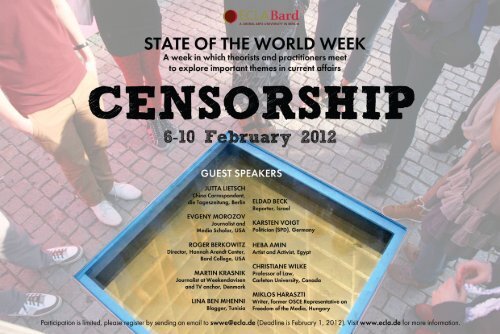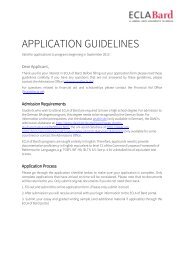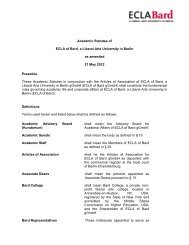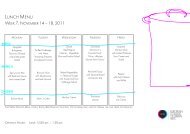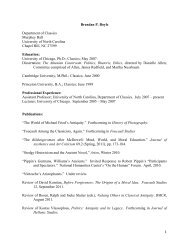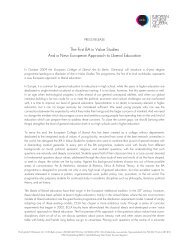here - European College of Liberal Arts, Berlin
here - European College of Liberal Arts, Berlin
here - European College of Liberal Arts, Berlin
You also want an ePaper? Increase the reach of your titles
YUMPU automatically turns print PDFs into web optimized ePapers that Google loves.
State <strong>of</strong> the World Week<br />
6 – 10 February 2012<br />
CENSORSHIP<br />
Despite the rise <strong>of</strong> ‘new media’ more difficult to control and restrict within borders, censorship as the<br />
practice <strong>of</strong> limiting, regulating or expunging information, images and opinion continues to be a feature <strong>of</strong><br />
many political contexts. In addition to examining the familiar – current and historical -- manifestations <strong>of</strong><br />
censorship as a tool <strong>of</strong> repression, this year’s State <strong>of</strong> the World Week at ECLA considers the more<br />
subtle and unexpected ways in which censorship may operate in environments ostensibly open to<br />
freedom <strong>of</strong> expression, and in particular the role <strong>of</strong> technologies, cultural conflict, and institutional<br />
frameworks in determining what can be articulated and how. Our investigation leads us to consider the<br />
meaning and reach <strong>of</strong> the term ‘censorship’ as a way <strong>of</strong> classifying practices <strong>of</strong> affecting access to<br />
written, spoken or visual forms <strong>of</strong> representation. Must it always denote a conscious and direct repressive<br />
intervention? Are t<strong>here</strong> necessary forms <strong>of</strong> regulation for which it is not an appropriate term? Or should it<br />
be re-invoked to describe the effect <strong>of</strong> some <strong>of</strong> our most apparently ‘free’ exchanges and frameworks <strong>of</strong><br />
communication? And finally, what is the relationship between censorship and the material --- economic<br />
and social -- mechanisms through which viewpoints and accounts <strong>of</strong> the world are transmitted?<br />
DAILY THEMES<br />
Monday, February 6 Censorship and Transparency<br />
Tuesday, February 7 Censorship and Belief<br />
Wednesday, February 8 Censorship and the State<br />
Thursday, February 9 Institutions and Practices<br />
Friday, February 10 Technology and Dissent<br />
SCHEDULE OVERVIEW<br />
9:30 – 10:30 Lecture<br />
10:30 – 11:00 C<strong>of</strong>fee break<br />
11:00 – 12:00 Panel Discussion<br />
12:30 – 14:00 Lunch<br />
14:15– 15:45 Seminar I<br />
16:00 – 17:30 Seminar II<br />
17:30 – 19:00 Dinner<br />
19:15 – 21:45 Evening Event<br />
(Highlighted events are open to the public.)<br />
Morning Sessions: Eden (Dock 11), Breite Straße 43, 13187 Pankow<br />
Nearest Tram Stops:<br />
M1, M150 Pankow Kirche<br />
S+U Pankow (U2, M27, S2, S8) and ca. 10–minute walk
Monday, February 6<br />
Censorship and Transparency<br />
Keynote Address: Roger Berkowitz (9:30 – 10:30)<br />
The ‘Wikileaks’ revelations and the rhetoric <strong>of</strong> diverse popular movements such as ‘Occupy Wall Street’<br />
and the ‘Piratenpartei’ in Germany have shown us that oppositional discontent is overwhelmingly<br />
pervaded by a desire for ‘transparency’. However this wish is not so easily fulfilled as perhaps thought,<br />
due to corporate influence on the terms <strong>of</strong> political debate. Through a discussion <strong>of</strong> relevant legal cases,<br />
and an examination <strong>of</strong> political theory which challenges the connection between transparency and<br />
discourse itself, Roger Berkowitz explores the precise meaning and extent <strong>of</strong> its usefulness as a political<br />
demand.<br />
Panel Discussion: Roger Berkowitz (11:00 – 12:00)<br />
Seminar I (14:15 – 15:45)<br />
Text: Hannah Arendt, “Truth and Politics” from Between Past and Future<br />
Leader: Roger Berkowitz<br />
Seminar II (16:00 – 17:30)<br />
Truth as a Form <strong>of</strong> Censorship<br />
Text: Michel Foucault, "The Discourse on Language"<br />
Leader: Ryan Plumley, ECLA<br />
Evening Event: Student Project Exhibition on Censored Objects (19:15 – 21:45)<br />
Venue: Kuckh<strong>of</strong>fstrasse 41 – 43, Library (former music room)<br />
Organized by Iuliia Babenko (AY’12)
Tuesday, February 7<br />
Censorship and Belief<br />
Keynote Address: Martin Krasnik (9:30 – 10:30)<br />
In 2005, an extraordinary scandal erupted as the Danish daily newspaper Jyllands-Posten published<br />
cartoons <strong>of</strong> the prophet Muhammad. Protests broke out around the world, leading to the deaths <strong>of</strong> more<br />
than fifty people in Asia, Africa and the Middle East, and to widespread spontaneous economic<br />
sanction against Danish exports. The events also sparked an intense debate: were such caricatures a<br />
legitimate means <strong>of</strong> testing Islamic cultural modernity, or were they a frivolous use <strong>of</strong> the freedoms <strong>of</strong> a<br />
liberal-secular society unable to question its own norms or sources <strong>of</strong> discomfort? The cartoon scandal<br />
also showed the way in which larger controversies and processes (such as the fissures opened by the<br />
“war on terror”, the conflict in Israel-Palestine, or immigration policies) could become coagulated into the<br />
provocation <strong>of</strong> a printed image. Martin Krasnik explores the effect <strong>of</strong> the episode on the practices <strong>of</strong> the<br />
press and media, and its wider implications for the public sp<strong>here</strong>.<br />
Panel Discussion: Martin Krasnik, other speakers to be confirmed (11:00 – 12:00)<br />
Seminar Ia (14:15 – 15:45)<br />
Text: John Stuart Mill, “On the Liberty <strong>of</strong> Thought and Discussion”<br />
Leader: Martin Gak, ECLA<br />
Seminar Ib (14:15 – 15:45)<br />
What Have Books Ever Done to Us: Book Burning and Belief in the Modern World<br />
Leader: Marcela K. Perett, ECLA<br />
Seminar II (16:00 – 17:30)<br />
Thomas Nagel on Self-Censorship<br />
Leaders: David Hayes and Thomas Norgaard, ECLA<br />
Evening Film Screening (19:15 – 21:45)<br />
Bob Fosse, Lenny (1974)<br />
Venue: Lecture Hall, P98a<br />
Leader: Matthias Hurst, ECLA
Wednesday, February 8<br />
Censorship and the State<br />
Keynote Address: Miklos Haraszti (9:30 – 10:30)<br />
With the fall <strong>of</strong> Communism in Eastern Europe and Central Asia in the early 1990s, the landscape <strong>of</strong><br />
media representation also underwent dramatic transformation. From state media agencies charged with<br />
conveying propaganda as well as prohibiting the influx <strong>of</strong> alternative information and perspectives,<br />
arose to varying degrees the range <strong>of</strong> private and independent outlets typical in western countries.<br />
However, along with the problem <strong>of</strong> monopoly control in the service <strong>of</strong> oligarchical economic interests<br />
has been witnessed the emergence <strong>of</strong> a ‘new nationalism’, determined—<strong>of</strong>ten in cooperation with such<br />
interests—to re-introduce explicit state control over media production and opinion. An advocate and<br />
activist for freedom <strong>of</strong> the press in his native Hungary, Miklos Haraszti surveys and assesses this<br />
phenomenon t<strong>here</strong> and amid the vicissitudes <strong>of</strong> the post-1989 world in general.<br />
Panel Discussion: Silencing and the State in Central Asia, Eastern Europe and South<br />
America<br />
Miklos Haraszti and Christiane Wilke (11:00 – 12:00)<br />
Seminar I (14:15 – 15:45)<br />
Silence in Collective Memory and Forgetting: the Assassination <strong>of</strong> Yitzak Rabin in<br />
Israel<br />
Leader: Irit Dekel, ECLA<br />
Seminar I (14:15 – 15:45)<br />
Injury, Identity and Public Speech<br />
Text: Selections from Judith Butler, Excitable Speech<br />
Leader: Christiane Wilke<br />
Seminar II (16:00 – 17:30)<br />
Censorship and the State in Plato’s Republic<br />
Text: Books <strong>of</strong> the Republic are 376 d --403a (middle <strong>of</strong> Book 2 to middle <strong>of</strong> Book 3) and then also<br />
595a--608c (first part <strong>of</strong> book 10)<br />
Leader: Karen Gover, Bennington <strong>College</strong>
Thursday, February 9<br />
Institutions and Practices<br />
Keynote Address: Jutta Lietsch (9:30 – 10:30)<br />
In China as in the rest <strong>of</strong> the world the print media and public broadcasting are losing their role as the<br />
most important medium <strong>of</strong> information. Almost five hundred million Chinese are already using the<br />
internet; at least two hundred million are active as microbloggers. The government in Bejing encourges<br />
these new technologies—yet at the same time seeks to keep the flow <strong>of</strong> information in the country under<br />
control. Because censorship in these conditions can no longer be seamless, the Communist party has<br />
changed its methods: state-controlled media and propaganda functionaries now try to anticipate<br />
important topics and to ‘guide’ internet debates in their preferred direction. Technological filters, regularly<br />
updated lists <strong>of</strong> tabooed themes and economic penalties are only some <strong>of</strong> the methods <strong>of</strong> censorship in<br />
contemporary China. Jutta Lietsch reports on the latest developments and on her own experience as a<br />
correspondent in China.<br />
Panel Discussion: Forming Public Opinion<br />
Eldad Beck, Karsten Voigt, other speakers to be confirmed (11:00 – 12:00)<br />
Seminar I (14:15 – 15:45)<br />
Text: Selections from Wendy Brown, Regulating Aversion: Tolerance in the Age <strong>of</strong> Identity and Empire<br />
Leader: Naomi Sussmann, ECLA<br />
Seminar II (16:00 – 17:30)<br />
Text: Selections from Christa Wolf, The Quest for Christa T.<br />
Leader: Catherine Toal, ECLA<br />
Seminar II (16:00 – 17:30)<br />
Text: Amos Vogel, “Film as Subversive Art”<br />
Leader: Matthias Hurst, ECLA<br />
Evening Film Screening (19:15 – 21:45)<br />
Heba Amin, Voices from the Revolution<br />
Venue: Lecture Hall, P98a<br />
Leader: Heba Amin
Friday, February 10<br />
Technology and Dissent<br />
Keynote Address: Evgeny Morozov (9:30 – 10:30)<br />
Huge media excitement in Europe and North America greeted the idea <strong>of</strong> a ‘twitter revolution’ in Iran in<br />
2009; this phrase was also used to describe the unrest in Moldova <strong>of</strong> the same year. More recently, the<br />
contribution <strong>of</strong> ‘new media’ to the uprisings in Tunisia and Egypt has been a motif in their coverage in the<br />
global press. Often, though, the emphasis on the borderless fluidity, accessibility and autonomy <strong>of</strong> these<br />
modes <strong>of</strong> communication ignores two important factors: the degree <strong>of</strong> economic privilege still needed to<br />
acquire them, and the role <strong>of</strong> states in their censorship and control. Evgeny Mozorov presents the two<br />
sides <strong>of</strong> the relationship between social media, the technology needed to support these, and the political<br />
powers which hold sway in the spaces w<strong>here</strong> they might operate, assessing the potential both for the<br />
manipulation <strong>of</strong> information and opinion, and the possibility <strong>of</strong> dissent.<br />
Panel Discussion: Evgeny Morozov, Heba Amin and Lina Ben Mhenni (11:00 –<br />
12:00)<br />
Seminar I (14:15 – 15:45)<br />
Political Censorship in German Visual Culture, 1917-1937: George Grosz, John<br />
Heartfield and Otto Dix<br />
Leader: Aya Soika, ECLA<br />
Seminar I (14:15 – 15:45)<br />
Text: Václav Havel, The Power <strong>of</strong> the Powerless<br />
Leader: Michael Weinman, ECLA<br />
Seminar II (16:00 – 17:30)<br />
Vision and Power<br />
Text: Michel Foucault, Discipline and Punish<br />
Leader: Tracy Colony, ECLA
GUEST SPEAKERS<br />
Roger Berkowitz is Associate Pr<strong>of</strong>essor <strong>of</strong> Political Studies and Human Rights at<br />
Bard <strong>College</strong> and; Academic Director <strong>of</strong> Hannah Arendt Center for Politics and the<br />
Humanities. He is the author <strong>of</strong> The Gift <strong>of</strong> Science: Leibniz and the Modern Legal<br />
Tradition, an account <strong>of</strong> how the rise <strong>of</strong> science has led to the divorce <strong>of</strong> law and<br />
justice (Harvard, 2005). In 2009 Berkowitz edited a collection <strong>of</strong> conference<br />
papers to mark Hanna Arendt’s hundredth birthday under the title Thinking in Dark<br />
Times: Hannah Arendt on Ethics and Politics (Fordham University Press, 2009).<br />
Martin Krasnik is a Danish print and TV journalist. Krasnik holds PhD in political<br />
science from Copenhagen University, and has also attended Hebrew University in<br />
Jerusalem and London School <strong>of</strong> Economics. He is a member <strong>of</strong> the editorial board<br />
<strong>of</strong> the Danish weekly Weekendavisen and hosts a TV 2 NEWS-programme<br />
Ellemann | Lykket<strong>of</strong>t. Martin Krasnik is the author <strong>of</strong> the books De retfærdige – En<br />
islamisk stafet (The Righteous – an Islamic Baton, 2005) and Min amerikanske<br />
drøm – På jagt efter stjernerne (My American Dream – Hunting After Stars, 2008).<br />
During the Mohammed crisis he defended publication <strong>of</strong> the drawings by Jyllans-<br />
Postens and stressed the decisive significance <strong>of</strong> freedom <strong>of</strong> speech for democracy.<br />
Miklos Haraszti is a Hungarian writer, editor, pr<strong>of</strong>essor, and human rights<br />
promoter. He has most recently co-taught a course on global press freedom issues<br />
at Columbia University with Lee C. Bollinger. Convicted on “subversion” charges in<br />
the early 1970s, he went on to become a founder <strong>of</strong> Hungary’s democratic and<br />
free press movement. In 1989, he participated in the “Roundtable Negotiations” on<br />
the transition to free elections. As a member <strong>of</strong> the Hungarian parliament in the<br />
1990s, Haraszti authored the country's first laws on press freedom. From 2004 to<br />
2010, he served as the OSCE representative on freedom <strong>of</strong> the media and in<br />
October-November 2010 he headed the OSCE assessment mission for the U.S.<br />
midterm elections. Haraszti’s books, including A Worker in a Worker’s State and The Velvet Prison, have<br />
been translated into many languages.
Christiane Wilke is Assistant Pr<strong>of</strong>essor at the Department <strong>of</strong> Law at Carleton<br />
University, Canada. She has received her Ph.D. at the New School for Social<br />
Research. In her research Wilke examines how people deal with massive violence,<br />
and specifically how they talk about violence in legal categories. Her main project<br />
investigates how criminal trials for state repression in Argentina and Germany<br />
helped to create certain imaginaries <strong>of</strong> perpetrators and responsibility, <strong>of</strong> law and<br />
legality, and <strong>of</strong> suffering and victimhood. Wilke is the managing editor <strong>of</strong> the<br />
Canadian Journal <strong>of</strong> Law and Society.<br />
Karen Gover teaches philosophy at Bennington <strong>College</strong>, Vermont, with areas<br />
<strong>of</strong> specialization in Continental philosophy, Aesthetics, and Ancient Greek<br />
philosophy. She studied English and Philosophy with honors at the University <strong>of</strong><br />
Richmond, and received her PhD from Penn State University with a dissertation on<br />
Heidegger and Greek Tragedy. She has published scholarly articles in<br />
International Philosophical Quarterly, the Journal <strong>of</strong> the British Society for<br />
Phenomenology, the Journal <strong>of</strong> Aesthetics and Art Criticism, and the Journal <strong>of</strong><br />
Aesthetic Education. Gover is the recipient <strong>of</strong> a grant from the German Academic<br />
Exchange service, she was a fellow at Williams <strong>College</strong>'s Oakley Center for the Humanities, and she is<br />
the 2011 recipient <strong>of</strong> the John Fisher Memorial Prize in Aesthetics. Her art criticism has appeared in<br />
Sculpture Magazine, Ceramics: Art and Perception, and artcritical.<br />
Jutta Lietsch has lived in Asia for fifteen years. As Southeast Asia correspondent<br />
for the taz (the tageszeitung) she reported in the late 1990s on the upheavals in<br />
Southeast Asian states – from the overthrow <strong>of</strong> Suharto in Indoneisa and the death <strong>of</strong><br />
Pol Pot in Cambodia to the consequences <strong>of</strong> the Asian financial crisis in the entire<br />
region. For ten years she has written for the taz and other German-language media<br />
from China, and periodically also from North Korea and Mongolia. In collaboration<br />
with Andreas Lorenz she wrote the book Das andere China (The Other China),<br />
published by WJS in <strong>Berlin</strong>.<br />
Karsten Voigt is a German politician (SPD). From 1976 to 1998 he was a<br />
member <strong>of</strong> the German parliament. Voigt has been the Coordinator <strong>of</strong> German-<br />
North American Cooperation at the German Federal Foreign Office from 1999 to<br />
2010. He is a board member <strong>of</strong> the Atlantik-Brücke, an association which promotes<br />
German-American understanding.
Eldad Beck is a <strong>Berlin</strong>-based correspondent for Israel’s largest circulation daily,<br />
Yedioth Ahronoth. He is among the very few Israeli journalists who reported about<br />
the dramatic events <strong>of</strong> the so called "Arab Spring" from the places history was<br />
shaped. Beck, who was Middle Eastern Affairs correspondent for several Israeli<br />
media in the past, studied Arabic and Islam in Israel and in Paris (Collège de<br />
Sorbonne).<br />
Evgeny Morozov is the author <strong>of</strong> The Net Delusion: The Dark Side <strong>of</strong><br />
Internet Freedom. Morozov is currently a visiting scholar at Stanford University<br />
and a Schwartz fellow at the New America Foundation. He is a contributing<br />
editor to Foreign Policy and Boston Review. He was formerly a Yahoo! fellow<br />
at the Institute for the Study <strong>of</strong> Diplomacy at Georgetown University and a<br />
fellow at George Soros's Open Society Institute, w<strong>here</strong> he remains on the<br />
board <strong>of</strong> the Information Program. Before moving to the US, Morozov was Director <strong>of</strong> New Media at<br />
Transitions Online, a Prague-based media development NGO active in 29 countries <strong>of</strong> the former Soviet<br />
bloc. Morozov attended the Project Year programme at ECLA in 2005-2006.<br />
Heba Amin is an Egyptian artist whose work seeks to map collective<br />
memory as it relates to the built environment. Her theoretical and studio-based<br />
work addresses themes related to urban planning, mapping, migration/<br />
immigration and language as an aesthetic database to explore junctures,<br />
failures, and flawed memory. She works in an archival nature, drawing from<br />
collections <strong>of</strong> work to reconfigure and make meaning <strong>of</strong> the subject through<br />
different materials, most <strong>of</strong>ten manifesting as video, installation, and projection<br />
performance. Amin is a current DAAD scholar and lives in <strong>Berlin</strong>.<br />
Lina Ben Mhenni is a Tunisian blogger, internet activist and university<br />
linguistics teacher. Mhenni's blog, A Tunisian Girl, is written in Arabic, English,<br />
and French. During the rule <strong>of</strong> former Tunisian President Zine El Abidine Ben<br />
Ali, Mhenni was one <strong>of</strong> the few bloggers to blog using her real name. Her<br />
blog, as well as her Facebook and Twitter accounts, were censored under the<br />
Ben Ali regime. Mhenni has been awarded the Deutsche Welle International<br />
Blog Award and El Mundo’s International Journalism Prize.


